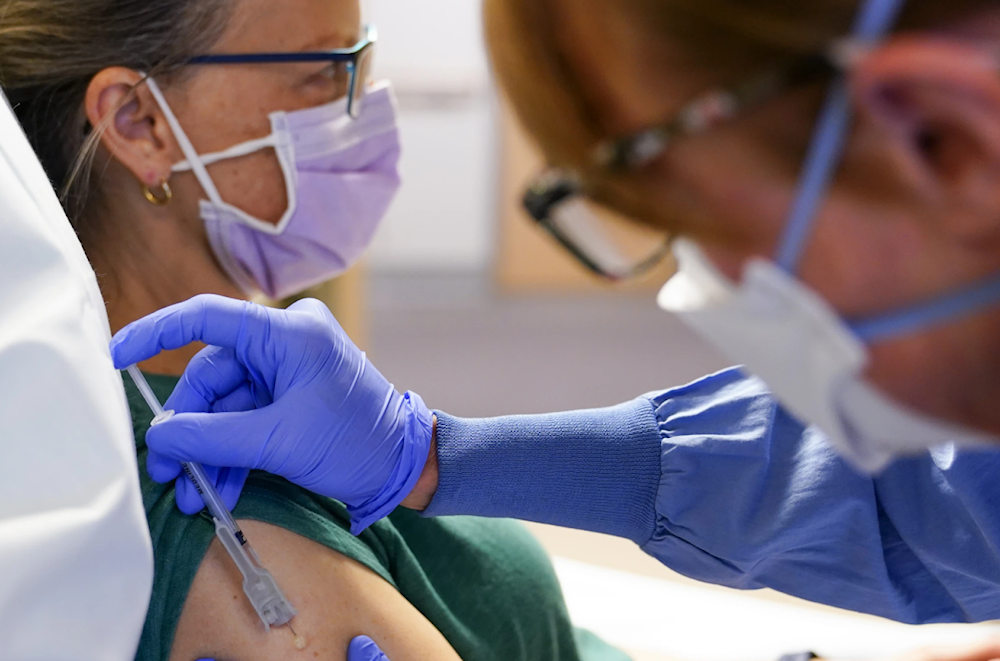Hopes for cancer cure as personal mRNA vaccine for melanoma trialled
Experts are currently studying new jabs that are custom-built for each patient and instruct their bodies to hunt out cancer cells to prevent the return of the disease.
-

A nurse administers the third dose of an experimental breast cancer vaccine to patient Kathleen Jade at the University of Washington Medical Center in Seattle on May 30, 2023 (AP)
Physicians have begun testing the world's first personalized mRNA cancer vaccine for melanoma on a number of patients, with experts hailing its "game-changing" ability to irreversibly cure cancer.
Melanoma affects around 132,000 individuals worldwide each year and is the leading cause of death from skin cancer. Currently, surgery is the primary treatment, however radiation, medications, and chemotherapy are occasionally employed.
Experts are currently studying new jabs that are custom-built for each patient and instruct their bodies to hunt out cancer cells to prevent the return of the disease.
A phase 2 experiment indicated that the immunizations significantly lowered the probability of cancer recurrence in melanoma patients. A final phase 3 experiment has been initiated, conducted by University College London Hospitals NHS Foundation Trust (UCLH).
MRNA therapy was administered to the first UK patients in February to evaluate the therapy’s safety and effectiveness in treating melanoma, lung cancer, and other solid tumors.
Dr. Heather Shaw, the trial's national coordinating investigator, indicated that the shots have the potential to cure melanoma and are being studied for other malignancies such as lung, bladder, and kidney.
Read more: Dr. Philip Salem: Lebanese architect of the cancer cure, ICTriplex
Shaw called the technology a “really finely honed tool," adding that the patients are "really excited about them."
The vaccination is an individualized neoantigen treatment. It is meant to activate the immune system so that it can fight back against a patient's particular kind.
The mRNA-4157 (V940) vaccine, targets cancer neoantigens that are expressed by tumors in a specific patient. These are tumor-specific signals that the immune system may identify.
The jab contains code for up to 34 neoantigens and stimulates an anti-tumor immune response based on the specific mutations found in a patient's malignancy.
To personalize it, a tumor sample is extracted during the patient's operation, which is then sequenced using DNA and artificial intelligence. As a consequence, the patient receives a personalized anti-cancer vaccine tailored to his or her tumor.
“It is absolutely custom-built for the patient," Shaw cited. “They may have some shared new antigens, but they’re likely to have their own very individual new antigens that are important to their tumour and so, therefore, it is truly personalized.”
Shaw stated that the ultimate goal is to permanently cure people of cancer
According to Phase 2 data, persons with significant high-risk melanomas who received the jab alongside the immunotherapy Keytruda were nearly half (49%) as likely to die or have their disease return after three years as those who had only Keytruda.
Patients received 1mg of the mRNA vaccine every three weeks for a maximum of nine doses, followed by 200mg of Keytruda every three weeks (maximum of 18 doses) for approximately a year.
The phase 3 worldwide study will now encompass a broader variety of patients and seeks to enroll around 1,100 participants. The UK arm plans to enroll at least 60 to 70 patients across eight centers, including London, Manchester, Edinburgh, and Leeds.
Steve Young, 52, of Stevenage, Hertfordshire, is one of the first patients to participate in the UCLH experiment. "I'm really, really excited," he remarked. "This is my best chance at stopping the cancer in its tracks."

 3 Min Read
3 Min Read








